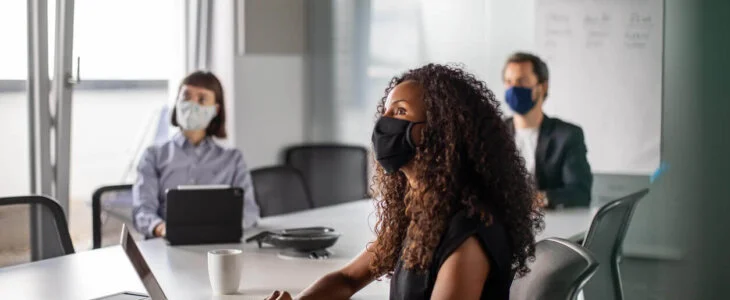In May, Governor Cuomo signed the New York Health and Essential Rights Act, or NY HERO Act, into law. The measure is intended to prevent occupational exposure to an airborne infectious disease by requiring employers in the state to adopt a health and safety plan to protect employees.
The Department of Labor (DOL) will be creating model airborne infectious disease safety standards, and employers face potential liabilities for violating those standards. The best way for employers to understand their health and safety obligations in the new normal is to consult with an experienced employment lawyer. In the meantime, this article is a brief discussion of the NY HERO Act.
The New York Health and Essential Rights Act (NY HERO Act)
The HERO Act amends the New York Labor Law by adding two new sections that require (1) all employers to establish model safety plans and (2) employers with 10 or more employees to establish joint management-employee workplace safety committees.
The Act covers all employers in the state, regardless of size, and defines “employees” broadly as individuals providing labor or services for remuneration. This includes part-time workers, independent contractors, domestic workers, home health and personal care workers, and seasonal workers. State and federal agencies are exempt; therefore, governmental agency employees are not covered.
Safety Standards
The Act requires the DOL Commissioner to create model airborne infectious disease safety standards (“Model Standards”), in conjunction with the Department of Public Health, that will establish minimum requirements for preventing exposure to airborne infectious diseases for all work sites. The standards will cover matters such as:
- Employee health screenings
- Face coverings
- Employer-provided personal protective equipment (PPE)
- Hand hygiene
- Cleaning and disinfecting of shared work equipment and surfaces (e.g. work stations, telephones, doorknobs)
- Social distancing protocols
- Engineering controls (e.g. proper air flow, ventilation)
HERO Plans
The Act requires employers to adopt industry-relevant Model Standards — a HERO Plan — within 30 days after they are published by the Commissioner. Employers have the choice to adopt the Model Standards or establish a safety plan that exceeds the minimum requirements established by the commissioner. An employer that decides to establish its own standards must do so in consultation with employees or, for union workers, through the collective bargaining process.
The HERO Plan must be distributed to all employees, posted conspicuously at the worksite, and incorporated into the employee handbook, if the employer maintains one. Employers must also:
- Verbally review the HERO plan with employees
- Inform employees of their right to report health and safety concerns
- Designate a supervisory employee to enforce HERO Plan compliance
Finally, employers are required to make the plan available for review upon request by employees, independent contractors, employee representatives, the DOL Commissioner, or the public health commissioner.
Joint Management-Employee Workplace Safety Committee
Effective November 1, 2021, the Act requires employers with at least 10 employees (covered employers) to permit employees to establish and administer a joint labor-management workplace safety committee. Two-thirds of the committee must be non-supervisory employees.
The Act authorizes safety committees to:
- Raise health and safety concerns with management
- Review policies enacted in the workplace in response to laws and executive orders
- Participate in government agency health and safety worksite visits
- Review employer-filed workplace health and safety reports
Discrimination and Retaliation Prohibited
The NY HERO Act prohibits employers from discriminating and retaliating against employees who (1) exercise their rights under the Act, (2) report health and safety violations, (3) participate in workplace safety committees, or (4) refuse to work because they reasonably believe that the worksite exposes then to dangerous conditions that are inconsistent with the law or the safety plan, as long as the employer was notified of the condition or should have known of the condition, and failed to cure it.
Penalties for Violations of the NY HERO Act
Employers who fail to adopt a HERO Plan face civil penalties of up to $50 per day. The Commissioner is also authorized to assess penalties against employers that fail to follow a plan of no less than $1,000 and not more than $10,000. Finally, the Act permits employees to pursue a civil action to seek injunctive relief if an employer violates the HERO plan. The courts may award costs, reasonable attorneys’ fees, and liquidated damages.
The Takeaway
Though it is unclear how long it will take the DOL Commissioner to publish the Model Standards, employers should be proactive in evaluating their return-to-work guidelines and facilities to determine what steps need to be taken to ensure compliance with the coming health and safety requirements. Ultimately, employers should consult with an employment lawyer now to prepare for the NY HERO Act.

